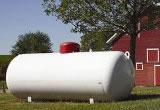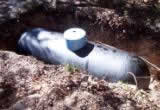Personally I recommend the use of propane (LPG).
If you currently have natural gas already coming into your home, you will find that it is less expensive and will require less disruption to your property to connect to it, rather than to install an above or below ground propane tank. However, in the event of a disaster which cuts the electrical power to your home, it is not uncommon to have the natural gas service disrupted as well.
By using natural gas, you could place your self in the situation that you have a standby generator without fuel! The installation of a propane tank, while being more expensive and disruptive to your property will ensure that you have self contained power system - the standby generator and the fuel necessary to operate it.
You could opt for a diesel fuel tank, and have self contained power system. Diesel fuel, however, has an inherent problem, it literally goes stale within a very short period of time, in some cases less than a month, requiring the tank to be emptied, and the fuel discarded.
Considering the expensive of disposing of stale diesel fuel and the necessity of the standby generator to work when required, diesel fuel for a residential standby generator is generally not a good solution.
Propane Fuel:
A propane fuel tank can be installed above (Figure 1) or below ground (Figure 2). In many cases the fuel tank is rented or leased to the homeowner by a local propane company.

Figure 1 - Above ground propane tank installation

Figure 2 - Below ground propane tank installation
The most common sizes for a above ground residential LPG tank are shown in Table 1 and for residential below ground LPG tanks are shown in Table 2:
Note: The exact physical dimensions of the propane tanks will vary depending on the manufacturer and Tables 1 and 2 should be used as guidelines only. For exact dimensions check the detailed specification sheets of the specific manufacture.
Table 1 - Common Sizes Of Above Ground Propane Tanks |
||||
Length |
||||
Diameter |
||||
Weight (empty) |
||||
Table 2 - Common Sizes Of Below Ground Propane Tanks |
|||
Length |
|||
Width |
|||
Depth |
|||
The size of the tank is relative to the length of time that you want assurance that you will have enough fuel to power your standby generator in the event your electrical service is disrupted. There is no set rule, with many individuals opting for 72 hours (3 days) of operation, while others opt for 120 hours (5 days) of operation.
The calculation of fuel for operating hours is relatively simple. Each standby generator manufacture will specify the amount of fuel consumed by a specific generator engine, under half and/or full load. It is only necessary for you to determine the load and do some basic math.
In most cases the calculation of fuel consumption at half load for the desired period is an adequate calculation. It would be highly unusual to have a standby generator operate for 3 or 5 days at a continuous full load.
While propane generators actually burn gas (cubic feet per hour) not liquid, the tanks are specified in a liquid measurement. Hence, in some cases you may find that the manufacturer of the standby generator has specified a fuel consumption in cubic feet per hour.
Conversion of Cubic Feet Per Hour of Propane (ft³/hr) To Gallons of Propane:
100 cubic feet per hour (ft³/hr) = 2.7 Gallons
and
1 Gallon = 36.5 cubic feet per hour (ft³/hr)
As an example: If you have a standby generator that consumes 69 ft³/hr of propane at half load and you wanted to operate that standby generator for 72 hours you would require:
72 hours X 69 ft³/hr = 4,968 ft³/hr of propane
4,968 ft³/hr of propane = 49.68 ft³/hr X 2.7 gallons = 134 gallons of fuel
You would therefore require a 150 gallon tank.
Additional information on standby generators
